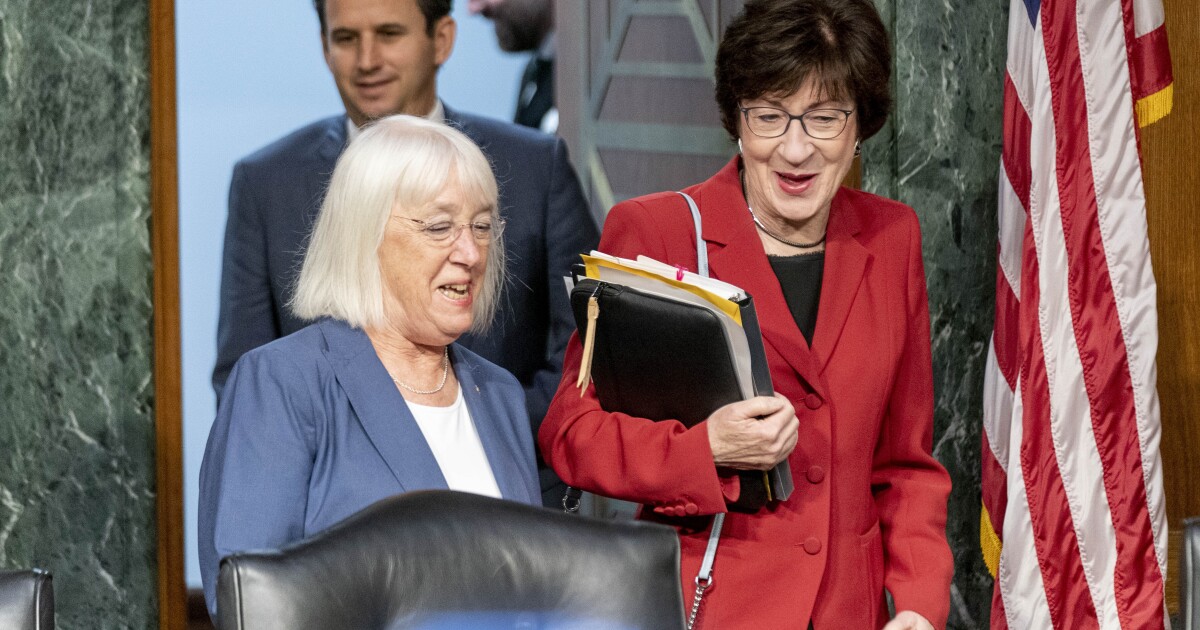

Senate Democrats on the powerful Appropriations panel are preparing to mark up government funding bills this week, setting up a battle with House Republicans, who are pursuing tens of billions of dollars in additional spending reductions for the upcoming fiscal year.
Key negotiators on the Senate committee are expected to officially set topline numbers for each of the 12 appropriations bills on Thursday, using the spending levels established in the debt ceiling bill. Sens. Patty Murray (D-WA) and Susan Collins (R-ME), the top two ranking members on the panel, said they plan to consider funding for subcommittees this week as well as mark up bills for the Military Construction, Veterans Affairs, and Agriculture subcommittees.
A ‘DEPARTMENT OF AI’? TECH GIANTS DISAGREE OVER GOVERNMENT REGULATORY EFFORT
“After holding nearly 40 hearings to assess our country’s needs for the coming year, we are keeping the appropriations process in the Senate moving forward in a bipartisan way,” Murray and Collins said in a joint statement late last week. “We have an obligation as Members of Congress to work together to write and pass funding bills in a timely way that address key challenges our nation faces, and we are determined to ensure the Senate’s voice is heard in this process.”
The action in the Senate this week comes as Republicans in the House adopted government spending levels for the next fiscal year last week below the levels agreed to by House Speaker Kevin McCarthy (R-CA) and President Joe Biden in debt ceiling discussions, setting up a future clash between the two chambers that could ultimately risk a government shutdown. Partial government shutdowns have occurred recently, with the longest one occurring in January 2019 for 35 days when then-President Donald Trump demanded money for a U.S.-Mexico border wall.
Last Thursday, the House Appropriations Committee voted 33-27 along party lines to adopt discretionary spending levels at $1.47 trillion for fiscal year 2024, which is about $120 billion below the $1.59 trillion that was initially negotiated in the debt ceiling bill. The plan maintains $866 billion for defense spending, which was agreed upon, but would cut spending for public assistance, foreign aid, and the environment. Instead, it would increase spending for drug enforcement, border security, and efforts to counter China.
McCarthy continues to face pressure from his right flank, who have been fuming about the deal the speaker cut with Biden, and have been going as far as working to tank popular party-line bills on the floor in protest over the last couple of weeks. Republicans in the House called their spending levels responsible and said they were in line with the debt ceiling deal, claiming the deal only capped spending.
“The debt ceiling bill set a ceiling, not a floor, for fiscal year 2024 bills. The allocations before us reflect the change members on my side of the aisle want to see,” said Appropriations Committee Chairwoman Kay Granger (R-TX) last week.
The pursuit of more non-defense spending cuts was the subject of intense debate in a House hearing last week, as Republicans applauded the move as a way to curb spending while Democrats accused them of going back on their word and disregarding the agreement.
“Do you think any of us would have made a deal if we thought your ‘22 number was the deal?” asked Rep. Steny Hoyer (D-MD). “What kind of deal is that? What kind of respect for yourselves is that?”
However, Senate Majority Leader Chuck Schumer (D-NY) signaled last week that House Republicans will have a difficult time extracting additional concessions as Senate appropriators work to craft their budgets.
“The bottom line is that I don’t think that would have much support in the Senate among Democrats or Republicans,” Schumer said to reporters on Tuesday.
Senate Minority Leader Mitch McConnell (R-KY) took a different approach and played down the expected differences between the House and Senate bills.
“At the end, we will have to work it out,” he said last week while speaking with reporters. “It’s not totally uncommon for these to be different as they move through the process. I think that’s probably what’s going to happen.”
CLICK HERE TO READ MORE FROM THE WASHINGTON EXAMINER
Senators on both sides of the aisle continue to brush off concern about the potential for a government shutdown.
“The crowd that is giving McCarthy trouble is irrelevant for purposes of getting appropriations bills passed,” said Sen. Chris Murphy (D-CT), a key member of the Appropriations Committee, last week. “When it comes to appropriations bills, you have to create a coalition that doesn’t include the Freedom Caucus.”





